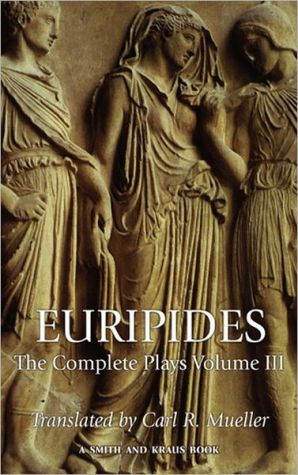

 |

|

Sold Out
Book Categories |
Athens of the fifth century B.C.E. represents one of the towering achievements of civilization. It is the crucible in which Western Civilization was given form. It created democracy, not in its modern parliamentary or representative form, but a direct democracy, one in which the Athenian citizen governed himself, which is what democracy means: rule by the people. Along with this gift to civilization came trial by jury, and from there the flowering of a culture whose achievement has led the world ever since: Philosophy, sculpture, architecture, poetry-and by no means least-theater. Of the three supreme tragedians of Classical Athens, Aeschylus, in the first half of the century, took his tales largely from Homer and the Heroic World of war and warriors. Sophokles regarded man more humanistically, and created characters of grand moral integrity. Euripides, the last of the three, created his image of man less heroically, less idealistically. His image of man reflected what Athens became from mid-century onward: a super wealthy world power, a cruel colonist, and an ever-present danger to its Greek neighbors, a threat that precipitated the devastating Peloponnesian War (431-404) which was to end with the fall of Athens. The glory of Athens, then, from mid-century onward, degenerated fast into a world of collapsing political and moral structure, and this is the world that Euripides mirrors in his characters. His people are no longer the heroes of Aeschylus, the moral giants of Sophokles, but men who are frequently petty, conniving, small minded, out for themselves and their own aggrandizement. They are psychologically drawn, they are conflicted, they are frequently mad-in a word, they are us, if only we look deeply enough. Euripides is the most modern of the Greek tragedians. Volume I: Alkêstis, Mêdeia, Children of Heraklês, Hippolytos.
Volume II: Andromachê, Hêkabê, Suppliant Women, Êlektra, The Madness of Heraklês.
Volume III: Trojan Women, Iphigeneia in Tauris, Ion, Helen, Cyclops.
Volume IV: Phoenician Women, Orestês, Bakkhai, Iphigeneia in Aulis, Rhesos. Of Mueller's Aeschylus translations, PAJ (Journal of Performance and Art) has written: "For those who want their Greek alive and kicking (and screaming and bleeding), these translations of Aeschylus's extant works will serve as a vital and exhilarating read. But more importantly, they will serve as superb acting texts of the world's earliest playwright for today's directors and designers." And Library Journal writes of his Sophokles co-translations: "These contemporary English translations . . . bring Sophokles dramatically to life and serve to enhance our appreciation of the timelessness of his work."
Login|Complaints|Blog|Games|Digital Media|Souls|Obituary|Contact Us|FAQ
CAN'T FIND WHAT YOU'RE LOOKING FOR? CLICK HERE!!! X
 You must be logged in to add to WishlistX
 This item is in your Wish ListX
 This item is in your CollectionEuripides: The Complete Plays, Volume III
X
 This Item is in Your InventoryEuripides: The Complete Plays, Volume III
X
 You must be logged in to review the productsX
 X
 X

Add Euripides: The Complete Plays, Volume III, Athens of the fifth century B.C.E. represents one of the towering achievements of civilization. It is the crucible in which Western Civilization was given form. It created democracy, not in its modern parliamentary or representative form, but a direct dem, Euripides: The Complete Plays, Volume III to the inventory that you are selling on WonderClubX
 X

Add Euripides: The Complete Plays, Volume III, Athens of the fifth century B.C.E. represents one of the towering achievements of civilization. It is the crucible in which Western Civilization was given form. It created democracy, not in its modern parliamentary or representative form, but a direct dem, Euripides: The Complete Plays, Volume III to your collection on WonderClub |